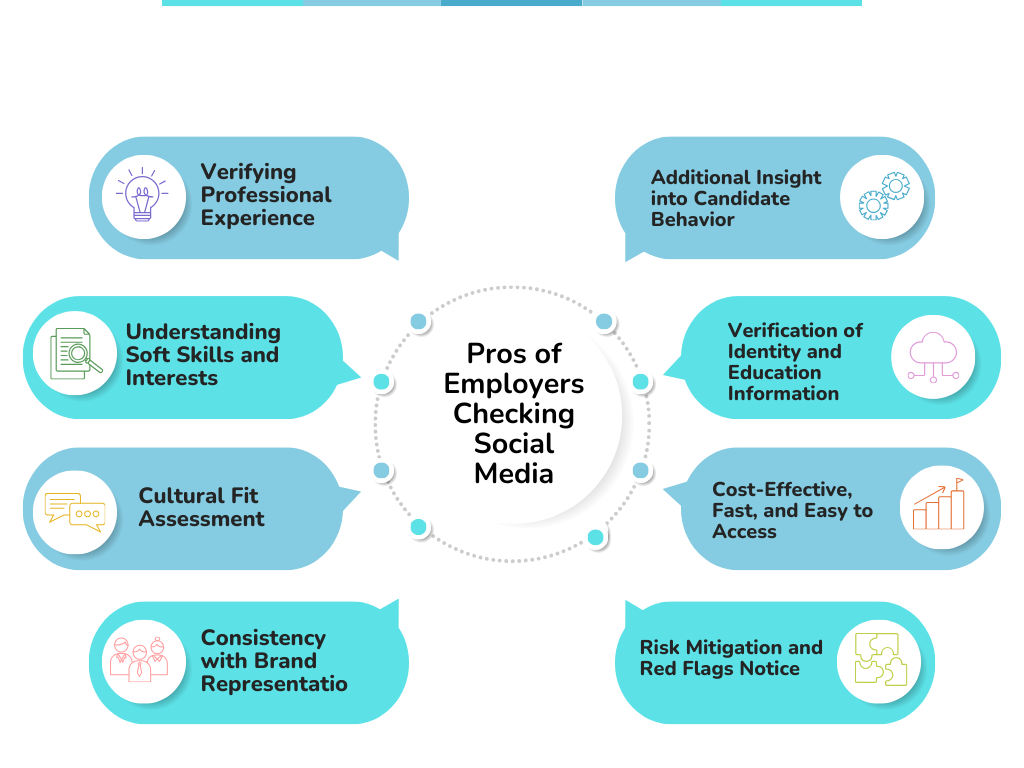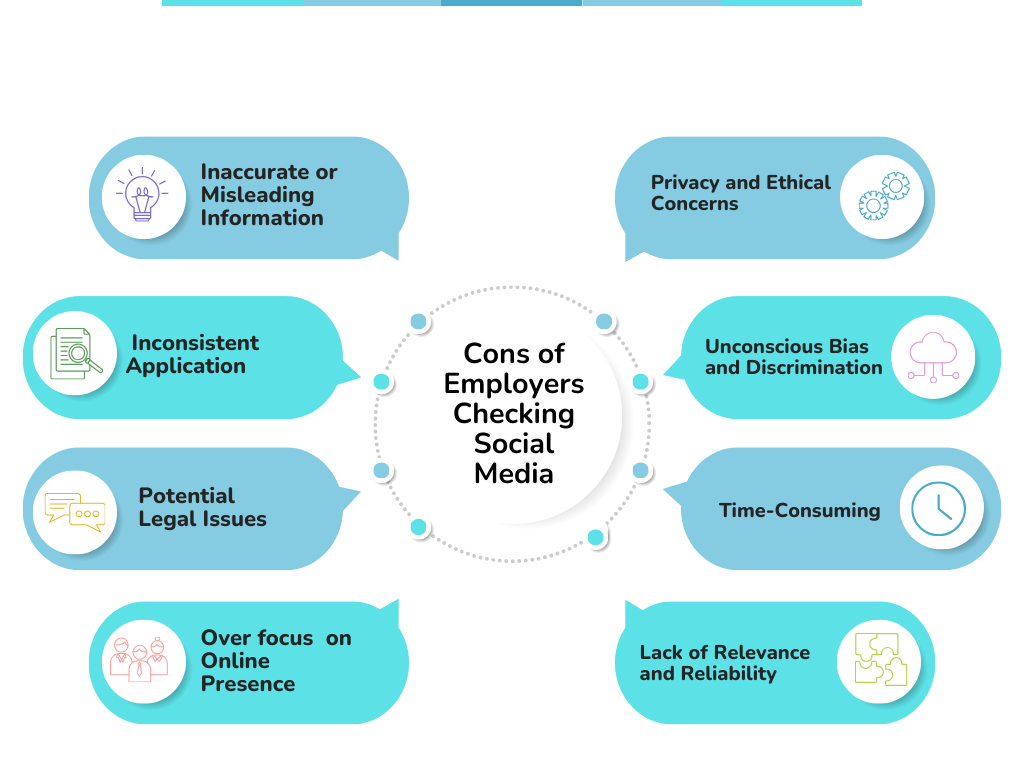Pros and Cons of Employers Checking Social Media for Screening

Employers have increasingly started using social media as a tool for screening potential candidates. While this approach offers several advantages, there are also potential drawbacks that must be carefully considered. This article will outline the pros and cons of employers checking social media, helping you make informed decisions about using this method in your pre and post phases of hiring process
Traditional background checks are no longer enough to fully assess a candidate's suitability. That's where social media screening comes in – offering a deeper look into potential hires beyond their resumes and interviews. But while it offers a wealth of insights, it also raises concerns about privacy, fairness, and potential biases.
For employers considering this method, it's important to weigh the benefits against the risks. This article will explore the pros and cons of social media checks, helping you navigate this evolving trend in the hiring process. Whether you're hiring a social media analyst or run background checks with AI, these insights will guide you in making smarter, more confident decisions.
What is Social Media Screening?
A pre-employment social media screening (also called a social media background screening or check) is the practice of researching a job applicant’s profiles and activities on social networking platforms to gain additional insights. Many employers will research job candidates’ social media posts through an Instagram background check, Twitter background check, background check on Facebook, and even a TikTok background check.
This process helps employers analyze a candidate’s online behavior, which can provide important insights into their character and qualifications.
For more details, you can explore our comprehensive guide on Social Media Background Screening, and learn about the differences between pre and post-hire social media screening.
Pros of Social Media Screening

Employers who use social media screening can gain insights that are otherwise difficult to obtain through traditional methods.
Adopting social media screening for today's recruiters is essential for identifying potential risks and enhancing hiring strategies.
Social media screening for insurance companies, for example, can help identify potential risks, while the benefits of social media background checks include evaluating a candidate's behavior, communication skills, and values. Here are some of the main benefits:
1. Additional Insight into Candidate Behavior
Checking a candidate’s social media profile can provide hiring managers with a more detailed understanding of their behavior outside of formal interview settings.
Industries like TV casting utilize social media screening to better understand candidates’ personalities. Understanding candidate behavior can help potential employers make more informed decisions.
2. Verification of Identity and Education Information
Social media can be a useful tool for verifying the identity and educational background of a candidate. For educational institutions, social media screening for schools is important for ensuring the accuracy of a candidate's claims.
3. Cost-Effective, Fast, and Easier to Access than Other Background Check Types
Social media screening is generally quicker and more affordable than other types of background checks, making it an attractive option for many employers during the job search process. By reducing recruitment cost, this method helps streamline the hiring process.
Educational institutions have found that social media screening can speed up the hiring process significantly.
4. Risk Mitigation and Red Flags
Social media screening can help employers identify potential risks early on by reviewing public posts. Many organizations, such as summer camps, use social media screening to ensure that candidates don’t pose any risks to the workplace.
5. Understanding and Verifying Professional Experience
Some roles, such as healthcare positions, benefit greatly from social media screening due to the importance of maintaining a professional life in and out of work. The importance of social media screening in healthcare is highlighted in fields where patient safety and professional integrity are important.
Additionally, integrating this screening method into the hiring process can enhance the overall candidate experience by ensuring that only the most qualified and suitable candidates move forward.
6. Understanding Soft Skills and Interests
A candidate's social media can show potential employers their personal skills and hobbies, helping hiring managers get a better sense of who they are beyond just their qualifications.
7. Cultural Fit Assessment
It’s important to see if a candidate will fit into the company culture by reviewing their social media profiles. Social media can help employers determine if the person’s values and personality match the company’s way of working. Learn more about cultural fit.
8. Consistency with Brand Representation
Candidates who engage in activities that don't align with the company's culture may not be suitable hires. Employers can protect their brand by ensuring that potential employees have a consistent and clean online presence.
Cons of Social Media Screening

While there are benefits to social media screening, there are also some drawbacks:
1. Privacy and Ethical Concerns
Privacy issues shouldn’t be a concern as long as the employer is accessing public information that anyone can see, and there is no legal reason preventing them from doing so. However, it’s still important to maintain ethical standards when reviewing a candidate’s online presence.
2. Unconscious Bias and Discrimination
Screening candidates based on their social media presence can lead to unconscious bias or discrimination. Using AI tools like Ferretly's tools help reduce hiring bias by providing a more objective evaluation process.
3. Inaccurate or Misleading Information
Employers might not get a clear understanding of a candidate’s abilities and character from limited public social media content, especially if the candidate has private accounts. What’s visible online doesn’t always reflect the full picture.
4. Time-Consuming
Reviewing social media for numerous candidates can take a lot of time. Automated tools like Ferretly, can help ease this by quickly analyzing years of data across multiple profiles.
5. Lack of Relevance and Reliability
The information found on social media may not always be relevant to the job, and can sometimes lead to unnecessary disqualifications.
6. Over focus on Online Presence
Relying too heavily on social media when evaluating candidates can lead to missing out on their real-world skills and qualifications.
7. Inconsistent Application
Using social media screening inconsistently across candidates can result in unfair hiring practices and may even lead to legal complications.
8. Potential Legal Issues
Potential employers must be cautious about potential legal ramifications, such as violating anti-discrimination laws or privacy protections.
9. False Positives/Negatives
There is always the risk of misinterpreting online behavior, leading to a candidate being unfairly judged.
How Ferretly Helps Overcome the Cons of Social Media Screening
Ferretly addresses the challenges of social media background checks through its AI-powered platform, which ensures privacy and ethical standards are met for potential employers. Below are the ways Ferretly improves the process:
- Ensures Privacy and Ethics: Only public data is reviewed, protecting privacy and maintaining ethical standards.
- Reduces Bias: AI minimizes unconscious bias, providing objective, data-driven insights.
- Provides Context: Ferretly analyzes content in context, helping avoid misinterpretation of posts.
- Saves Time: Automated scans quickly review multiple profiles, reducing manual effort.
- Focuses on Relevant Info: Irrelevant personal content is ignored, focusing only on job-relevant behavior.
- Balanced Approach: Social media insights are combined with traditional assessments for a complete view.
- Consistent Screening: All candidates are evaluated equally, ensuring fairness.
- Legal Compliance: Ferretly adheres to legal standards, reducing the risk of violations.
- Reduces Misinterpretation: AI helps minimize false positives and negatives by accurately analyzing content.
If you’d like to see how Ferretly can improve your hiring process, Request a demo today or learn how Ferretly reduces workplace violence risk.
Tips for Using Social Media Screening
To maximize the benefits of social media screening, follow these tips:
- Create a Clear Social Media Screening Policy
- Limit Screening to Relevant Content
- Use a Third-Party Screening Service
- Use Other Types of Background Checks
- Be Aware of Legal Considerations
- Establish Objective Criteria for Screening
- Use Social Media Screening as a Supplement
- Document the Process
- Be Consistent with All Candidates
- Respect Privacy Settings
For more tips, read our guide on enhancing candidate evaluation or learn how to choose the right social media screening company.
Also Read: The Do’s and Don’ts of employment background checks.
Pros and Cons of Social Media Screening - Frequently Asked Questions
1. Should potential employers check social media?
Deciding whether to review social media accounts is a complex issue that should be evaluated by companies on a case-by-case basis.
While social media checks can provide insights into a candidate's behavior and fit with the company culture, they may also raise privacy and ethical concerns.
2. Why is social media screening good?
Social media screening offers valuable insights into your job candidates beyond what's found on a resume. It can reveal personality traits, interests, and soft skills that may not be evident in formal interviews.
3. Do employers usually look at social media?
Yes, employers perform social media checks not only to identify potential concerns but also to confirm that a candidate’s public social media profiles align with the company’s values.
This practice helps employers ensure that their hires will represent the organization positively and fit within the workplace culture.
4. How do employers check social media accounts?
Employers typically check social media accounts by searching for candidates on platforms like LinkedIn, Facebook, and Twitter using their names. They review publicly available posts, comments, and photos to assess a candidate's professionalism, behavior, and personality.
Some employers use automated tools like Ferretly to streamline this process and ensure consistency in their evaluations. By cross-referencing social media information with resumes, employers aim to verify details like education and work experience while gaining insights into a candidate's fit for the role.
5. Can background checks see private social media?
A social media check will bring up any private social media accounts. However, it won't show what's on them if the account is private. So, an employer may be able to see that you have an account and that it is private social media accounts but, they will not be able to see your posts, images or data.
6. Can employers see private Instagram?
No, as previously mentioned, like all private social media accounts employers cannot see private Instagram posts or data. Only publicly available information.






